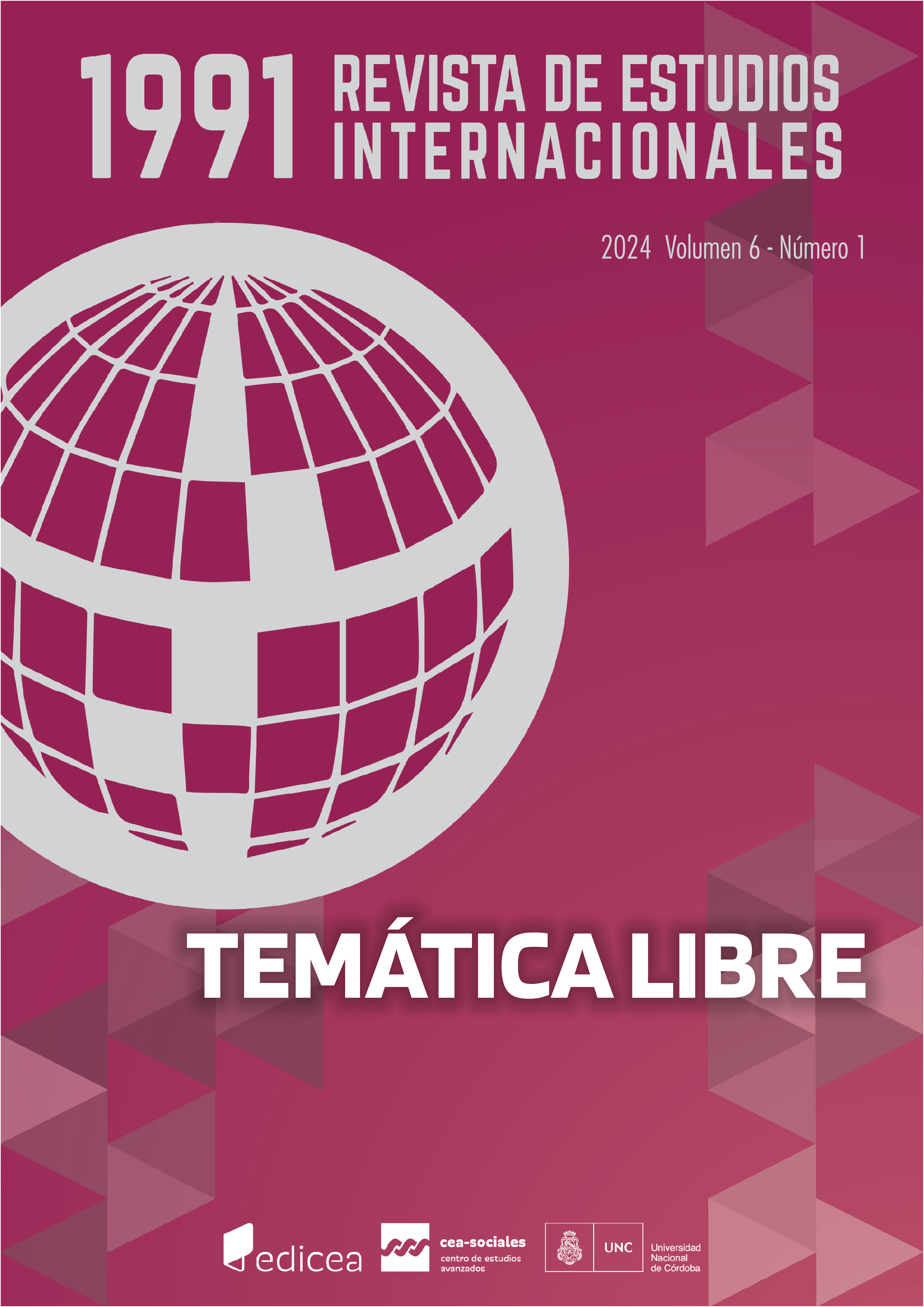Towards strengthening Indonesia-Namibia economic relations
Contenido principal del artículo
Resumen
This paper discusses current Indonesia-Namibia bilateral economic relations and explores opportunities and the way forward in elevating this existing relationship to a higher level. The study shows that the respective foreign policy agendas of these two nations coincide with their common interests particularly to enhance economic relations through economic diplomacy. Based on the product competitiveness mapping analysis, the study concludes that there are potential opportunities to strengthen bilateral trade relations due to the complementarity of both countries’ export products. The study also reveals the competitiveness of the two countries’ respective export products remains low. The partial equilibrium free trade simulation employed shows that both countries would potentially benefit from bilateral FTA arrangements. This is based on assumed higher trade volumes and consumer surpluses, which would offset predicted tariff revenue loss. The study also conducted the future scenario planning and trends analysis, in which the best scenario from the case is Scenario 3, where both countries should pursue Indonesia-SACU PTA as both parties would be better off based on the predicted economic potential benefits. Apart from trade, promoting Indonesian outbound investment and technical cooperation are another potential win-win economic cooperation for both countries.
Detalles del artículo
Sección

Esta obra está bajo una licencia internacional Creative Commons Atribución-NoComercial 4.0.
AVISO DE DERECHOS DE AUTORES
Licencia de Creative Commons
Esta obra está bajo una Licencia Creative Commons Atribución-NoComercial 4.0 Internacional.
Cómo citar
Referencias
Adnan, A. H. (2008). Perkembangan Hubungan Internasional di Afrika. Angkasa.
Asia Regional Integration Center (2023). Free Trade Agreements. Asian Development Website. https://aric.adb.org/fta-country
Bayne, N. & Woolcock, S. (2011). What is economic diplomacy? In N. Bayne & S. Woolcock (eds.), The New Economic Diplomacy: Decision-Making and Negotiation in International Economic Relations (pp. 1-16). Ashgate Publishing Ltd.
Bhagwati, J. (2008). Termites in the Trading System: How Preferential Agreements Undermine Free Trade. Oxford University Press.
Bösl, A., du Pisani, A. & Zaire, D. U. (2014). Namibia’s Foreign Relations: Historical Contexts, Current Dimensions, and Perspectives for the 21st Century. Macmillan Education.
Eldora, G. & Tjahyoputra, L. (9 January, 2020). Indonesia Perkuat Diplomasi Ekonomi. Investor.https://investor.id/international/202652/indonesia-perkuat-diplomasi-ekonomi
Embassy of the Republic of Indonesia in Windhoek (2015). Rencana Strategis (Renstra) 2015-2019 KBRI Windhoek. KBRI.
Embassy of the Republic of Indonesia in Windhoek (2021). Laporan Tahunan 2020 (Annual Report 2020). KBRI.
Indonesian Investment Coordinating Board (2021). Perkembangan Realisasi Investasi PMA Berdasarkan Negara Tahun 1990 s/d 2021. National Single Window for Investment, 2021. https://nswi.bkpm.go.id/data_statistik
Kemlu (2019). Pidato Menteri Luar Negeri: Penyampaian Prioritas Politik Luar Negeri Republik Indonesia 2019-2024. https://kemlu.go.id/portal/id/read/725/pidato/penyampaian-prioritas-politik-luar-%20negeri-republik-indonesia-2019-2024
Kemlu (2021). Kementerian Luar Negeri dan Pertamina Tandatangani Kerjasama Untuk Ekspansi ke Pasar Internasional. https://kemlu.go.id/portal/id/read/2111/berita/kementerian-luar-negeri-dan-pertamina-%20tandatangani-kerjasama-untuk-ekspansi-ke-pasar-internasional
Kemlu (2023). Menlu Retno : Indonesia Ingin Menjadi Bagian dari Kisah Sukses Pembangunan Ekonomi Afrika. https://kemlu.go.id/portal/id/read/4380/berita/menlu-retno-indonesia-ingin-menjadi-bagian-dari-kisah-sukses-pembangunan-ekonomi-afrika
Legal Assistance Centre (2023). Namibian Constitution. Legal Assistance Centre Website. https://www.lac.org.na/laws/annoSTAT/Namibian%20Constitution.pdf
Ministry of International Relations & Cooperation (2017). Namibia’s Foreign Policy on International Relations and Cooperation Document. MIRCO. https://mirco.gov.na/documents/140810/158796/Namibia%27s+Policy+on+International+Relations+and+Cooperation/9caa7be8-9ba2-4277-b9d5-3cabdcaedb10
Mushelenga, S. A. P. (2014). Principles and Principals of Namibia’s Foreign Relations. In A. Bösl, A. du Pisani, & D. U. Zaire (eds.), Namibia’s Foreign Relations: Historical Contexts, Current Dimensions, and Perspectives for the 21st Century (pp. 59-80). Macmillan Education Namibia.
Namibia Investment Promotion and Development Board (2022). Catalogue of Projects and Potential Investment Opportunities in Namibia.
Rachma, H. S. (2014). Jokowi Minta Duta Besar Lakukan Diplomasi Ekonomi dan Dagang. Merdeka. https://www.merdeka.com/uang/jokowi-minta-duta-besar-lakukan-diplomasi-ekonomi-dan-dagang.html
Republic of Namibia (2004). White Paper on Namibia’s Foreign Policy and Diplomacy Management. Ministry of Foreign Affairs.
SACU Secretariat (2022). SACU Investment Roundtable: Positioning SACU as an Industrial, Investment, Manufacturing and Innovation Hub for the African Continent and Beyond – A Compilation of Investment Projects in the SACU Region. SACU Secretariat. https://www.sacu.int/docs/roundtable/Final-SACU-Investment-Projects-booklet.pdf
Salvatore, D. (2014). International Economics: Trade and Finance. John Wiley & Sons.
Sjahril, S. (2021). Desain Klasterisasi Tujuan Pasar Ekspor Indonesia: Pasar Tradisional vs Pasar Non-Tradisional. Jurnal Hubungan Luar Negeri, January-June Edition. https://www.kemlu.go.id/portal/id/page/101/jurnal_hubungan_luar_negeri
United Nations COMTRADE (2023). International Trade Statistics. Un Comtrade Database. https://comtrade.un.org/data/
Widodo, T. (2010). Comparative Advantage: Theory, Empirical Measures and Case Studies. Review on Economic and Business Studies, 57-81. http://www.rebs.ro/articles/pdfs/21.pdf
World Integrated Trade Solution (2023). https://wits.worldbank.org/

